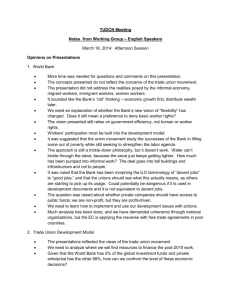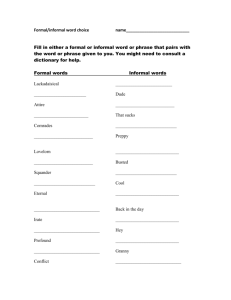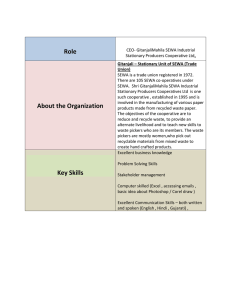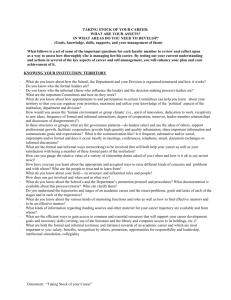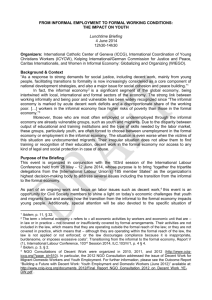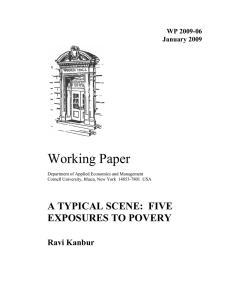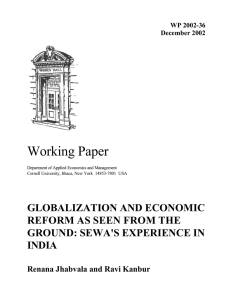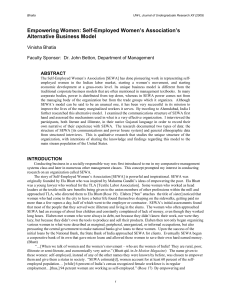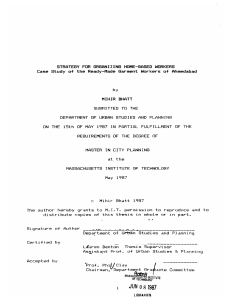Workers in the Informal Economy need decent work
advertisement
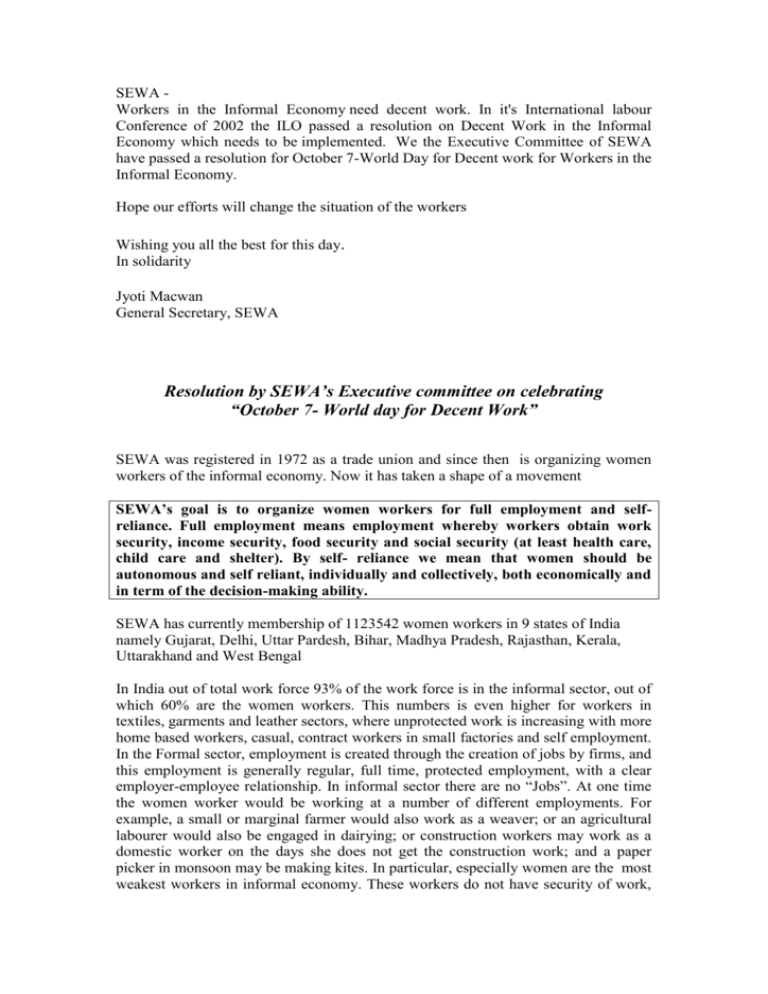
SEWA Workers in the Informal Economy need decent work. In it's International labour Conference of 2002 the ILO passed a resolution on Decent Work in the Informal Economy which needs to be implemented. We the Executive Committee of SEWA have passed a resolution for October 7-World Day for Decent work for Workers in the Informal Economy. Hope our efforts will change the situation of the workers Wishing you all the best for this day. In solidarity Jyoti Macwan General Secretary, SEWA Resolution by SEWA’s Executive committee on celebrating “October 7- World day for Decent Work” SEWA was registered in 1972 as a trade union and since then is organizing women workers of the informal economy. Now it has taken a shape of a movement SEWA’s goal is to organize women workers for full employment and selfreliance. Full employment means employment whereby workers obtain work security, income security, food security and social security (at least health care, child care and shelter). By self- reliance we mean that women should be autonomous and self reliant, individually and collectively, both economically and in term of the decision-making ability. SEWA has currently membership of 1123542 women workers in 9 states of India namely Gujarat, Delhi, Uttar Pardesh, Bihar, Madhya Pradesh, Rajasthan, Kerala, Uttarakhand and West Bengal In India out of total work force 93% of the work force is in the informal sector, out of which 60% are the women workers. This numbers is even higher for workers in textiles, garments and leather sectors, where unprotected work is increasing with more home based workers, casual, contract workers in small factories and self employment. In the Formal sector, employment is created through the creation of jobs by firms, and this employment is generally regular, full time, protected employment, with a clear employer-employee relationship. In informal sector there are no “Jobs”. At one time the women worker would be working at a number of different employments. For example, a small or marginal farmer would also work as a weaver; or an agricultural labourer would also be engaged in dairying; or construction workers may work as a domestic worker on the days she does not get the construction work; and a paper picker in monsoon may be making kites. In particular, especially women are the most weakest workers in informal economy. These workers do not have security of work, and many days of unemployment. They have no protection against being dismissed at any time. They do not have access to social security and much of their earnings go into health care. They have no support in their old age. Women have double burden of child care and work. They have very low earnings and poor conditions of work. Poverty is closely linked with informal work. Generally, they are not organized into trade unions Often the existing legal structure does not recognize the organizations/cooperatives and the trade unions of such workers. UN Millennium Summit in 2005 September also stressed “productive employment and decent work”. Livelihoods are also on the top of the list of SAARC Development Goals. In it's International labour Conference of 2002 the ILO passed a resolution on Decent Work in the Informal Economy. In August 2002 ILO stressed on Gender Equity and Decent work. SEWA believes that link between poverty and growth is WORK and the link between growth and informal work is women. Since the economic and social structures are so interrelated, the solutions too have to be integrated. This means that there is no one formula for poverty reduction rather it has to be an approach which address the various economic and social factors which cause and perpetuate poverty. The economic structure is closely connected with the social structure. For e.g. social needs such as health child care, education and housing are all linked to economic capabilities. Creating employment is then no longer a matter of creating ‘jobs’, but of strengthening these working poor to overcome structural constraints and enter markets where they would be competitive. Often these markets, which may be labour markets, products markets or financial markets, may not exist locally, and would need to be built up or institutions created which would link with the larger markets. So, in such case, we believe that workers in the informal economy need following things to reach this state of full employment 1. They need capital formation at the household and their group level through access to financial services (savings, credit, insurance) to build up and create assets of their own (land, house, workshed, equipment, cattle, bank balance). Asset ownership is the surest weapon to fight the vulnerability of poverty. 2. They need building of their capacity to stand firm in the competitive market i.e. access to market infrastructure, access to technology, information, education, knowledge and relevant skills (accountancy, management, planning, designing, e.g.). 3. They poor need social security - at least healthcare, childcare, shelter and insurance - to combat the chronic risks faced by them and their families. 4. Most importantly, they need collective, organised strength (through their associations) for Voice and representation in order to be able to bargain to be able to actively participate, in the planning, implementation and monitoring processes of the programmes that are meant for them, and also in all other affairs of the nation. Therefore the Executive committee of SEWA resolves that Ensuring all the workers of informal economy full employment and decent work To recognize and demand recognition for women workers of informal economy and to include them in laws and policies which ensures them decent livelihood. To work and advocate for policies which promote full employment and adequate income to these workers To promote full coverage of social security to these workers by extending existing schemes and formulating new ones. To promote alternative economic programme and interventions for workers to directly reach markets, so as strengthen their bargaining power. To assist the formation of member based organization especially trade unions, co-operatives, self help groups or any other type of organization of informal economy and to promote the same.
